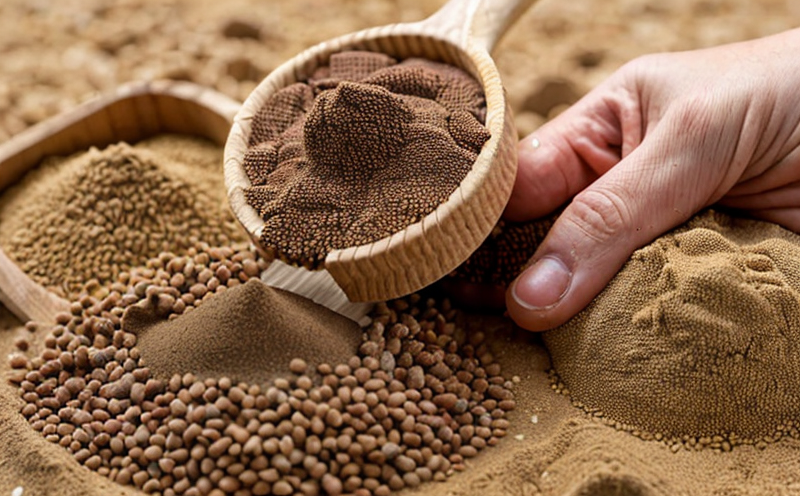Cottonseed Meal Quality Testing in Feed
In the agricultural and forestry sectors, cottonseed meal plays a pivotal role as an essential protein source for animal feeds. Ensuring its quality is critical to maintaining optimal health and productivity of livestock. This service focuses on comprehensive testing that guarantees the safety and nutritional integrity of cottonseed meal used in feed formulations.
The importance of this test cannot be overstated, especially considering the potential risks associated with contaminated or substandard feeds. Contaminants such as aflatoxins, heavy metals, and pesticides can severely impact animal health and welfare, leading to reduced growth rates, compromised immune systems, and even death in severe cases.
Our testing service covers a wide range of parameters including but not limited to:
- Aflatoxin levels
- Total protein content
- Fiber and ash content
- Lysine content
- Mineral profiles (calcium, phosphorus)
We employ advanced analytical techniques to ensure precision and reliability. Our state-of-the-art laboratory uses methods compliant with international standards such as ISO 6493:2018 for aflatoxin analysis and AOAC International protocols for amino acid determination.
The testing process begins with a thorough inspection of the cottonseed meal sample, ensuring it meets basic quality criteria before proceeding to more detailed analysis. Specimen preparation involves grinding the samples into fine powders suitable for accurate measurement. This is followed by rigorous laboratory analysis using equipment like high-performance liquid chromatography (HPLC) and atomic absorption spectrophotometry (AAS).
The results are meticulously documented and reported within a specified timeframe, providing clients with actionable insights that can be used to improve feed formulations or address any issues promptly.
By partnering with us for cottonseed meal quality testing in feed, you ensure compliance with regulatory requirements while also enhancing the overall quality of animal feeds. This not only contributes positively to livestock health but also supports sustainable agricultural practices by optimizing resource use and reducing waste.
Scope and Methodology
| Parameter Tested | Testing Method | Target Compliance Standards |
|---|---|---|
| Aflatoxin Levels | HPLC with fluorescence detection (ISO 6493:2018) | USDA, EU regulations |
| Total Protein Content | Nitrogen determination by Dumas combustion method (AOAC 985.27) | FDA requirements |
| Fiber and Ash Content | Loss on ignition (ASTM E1924-05) | Australian Standards |
| Lysine Content | HPLC with UV detection (AOAC 987.26) | Global standards, ISO 14305:2010 |
Why Choose This Test
Selecting the right testing service is crucial for maintaining high standards in animal feed quality. Our comprehensive cottonseed meal quality testing offers several advantages:
- Compliance with Regulations: Ensures adherence to local and international regulations regarding feed safety.
- Precision Analysis: Utilization of cutting-edge analytical techniques guarantees accurate results.
- Rapid Turnaround Time: Efficiently deliver reports within a short period, enabling prompt corrective actions if necessary.
- Expertise and Experience: Leveraging years of experience in agricultural testing ensures reliability and trustworthiness.
In addition to these benefits, our service contributes significantly to the sustainability goals of the agricultural sector by promoting efficient resource utilization and minimizing waste. By investing in this quality assurance process, you are not only safeguarding animal health but also contributing positively towards environmental conservation efforts.
Environmental and Sustainability Contributions
The testing of cottonseed meal for quality is integral to sustainable agricultural practices. By ensuring that feed meets strict safety and nutritional standards, we help reduce the incidence of animal illness and mortality, which in turn lowers the environmental footprint associated with veterinary treatments and disposal.
Furthermore, optimizing feed formulations based on accurate test results can lead to reduced food waste by enhancing livestock productivity. This efficiency translates directly into less land use, lower water consumption, and decreased greenhouse gas emissions from agriculture.
The use of recycled cottonseed meal also plays a vital role in circular economy principles within the agricultural industry. By reusing these materials effectively, we contribute to reducing landfill waste while simultaneously supporting feed production sustainability.
In summary, our testing service supports broader sustainable development goals by promoting responsible resource management and contributing positively to environmental conservation efforts in agriculture and forestry sectors.





